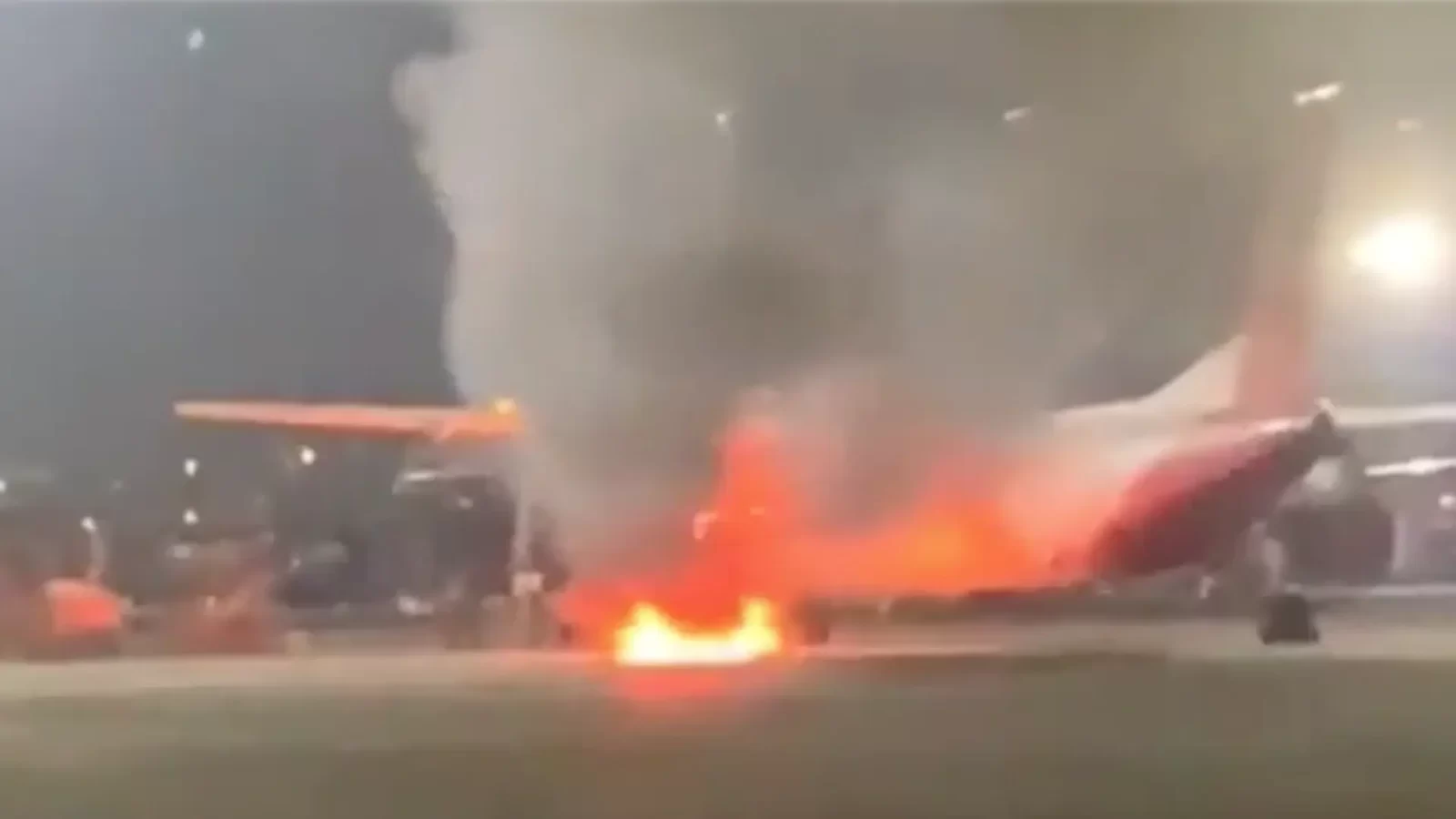Unveiling the Shocking Footage: SpiceJet Aircraft Catches Fire at Delhi Airport
Shocking Incident at Delhi Airport: SpiceJet Aircraft Fire During Maintenance
In a startling turn of events at Delhi airport, a SpiceJet turboprop aircraft, which was undergoing maintenance, experienced an engine fire.
The incident took place during an engine ground run at idle power at the bay, when an aircraft maintenance engineer (AME) detected a fire warning on one of the engines.
Prompt action was taken, and a fire extinguisher was discharged immediately, followed by the call for fire tenders.
The Aircraft Remained Unharmed, No Injuries Reported
Despite the alarming situation, it is a relief to know that the aircraft remained unharmed, and there were no reported injuries.
The skilled response from the maintenance personnel and the availability of fire tenders at the airport played a crucial role in averting a potential disaster.
The incident occurred just hours after the Directorate General of Civil Aviation (DGCA) lifted SpiceJet from enhanced surveillance, which raises questions about the safety protocols and procedures in place.
SpiceJet’s Statement
A spokesperson from SpiceJet reacted to the incident, shedding some light on the situation. According to the spokesperson, the incident happened on July 25, while a SpiceJet Q400 aircraft was under maintenance.
During the engine ground run at idle power at the bay, the AME noticed a fire warning on engine number one.
Without hesitation, the aircraft’s fire extinguisher bottle was promptly discharged, and as an extra precaution, the fire brigade was immediately called to the scene.
Thanks to their swift actions, the aircraft and all maintenance personnel involved were safe and unharmed.
Safety in Aviation Maintenance
This incident highlights the critical importance of safety measures and protocols in aviation maintenance.
Aircraft are complex machines that require regular checks, maintenance, and meticulous attention to ensure safe and efficient operations.
The incident at Delhi airport serves as a reminder that even during routine maintenance procedures, unexpected events can occur, and well-trained personnel must be prepared to handle such situations with utmost caution and speed.
The Role of Aircraft Maintenance Engineers (AMEs)
Aircraft Maintenance Engineers (AMEs) play a crucial role in the aviation industry.
They are responsible for the inspection, repair, and maintenance of aircraft to ensure their airworthiness. AMEs undergo extensive training to handle various scenarios and emergencies effectively.
Their vigilance and expertise are vital for the safety of passengers, crew, and aircraft.
The incident at Delhi airport exemplifies the importance of having skilled and attentive AMEs in the aviation workforce.
Enhanced Surveillance Measures
The mention of SpiceJet being lifted from enhanced surveillance by the DGCA sparks curiosity about the circumstances that led to the airline being under such scrutiny in the first place.
Enhanced surveillance is typically imposed when an airline has a higher-than-normal safety occurrence rate.
It involves increased oversight and monitoring of the airline’s operations to ensure that safety standards are met and maintained.
However, the specific reasons behind the enhanced surveillance on SpiceJet are not detailed in the available information.

Investigation and Preventive Measures
Following any aircraft incident, thorough investigations are conducted to identify the root causes and prevent similar occurrences in the future.
Aviation authorities and the airline’s safety teams will closely examine the event to determine whether it was an isolated incident or part of a broader safety concern.
Based on the findings, appropriate preventive measures will be implemented to enhance safety protocols and prevent similar incidents from happening again.
The recent engine fire incident during maintenance at Delhi airport serves as a reminder of the critical importance of safety in aviation.
Thanks to the swift actions of the aircraft maintenance engineer and the fire brigade, a potential disaster was averted, and no injuries were reported.
Nevertheless, this event should prompt further evaluation of safety protocols and procedures in place, and airlines must continuously strive to enhance their safety measures.
FAQs
1. Are incidents like this common in the aviation industry?
- While aviation incidents are relatively rare, they can happen from time to time. Rigorous safety protocols and well-trained personnel are essential in mitigating risks.
2. How often do aircraft undergo maintenance checks?
- Aircraft undergo regular maintenance checks as per strict schedules outlined by aviation authorities to ensure their airworthiness.
3. What is the role of the DGCA in aviation safety?
- The Directorate General of Civil Aviation (DGCA) is responsible for regulating civil aviation in India and ensuring safety and security.
4. How are AMEs trained for emergencies like engine fires?
- AMEs undergo comprehensive training, including simulation exercises, to handle various emergencies, including engine fires.
5. Can engine fires be prevented during maintenance checks?
- With proper maintenance procedures, vigilant inspections, and adherence to safety standards, the risk of engine fires can be significantly reduced, if not entirely prevented.






















